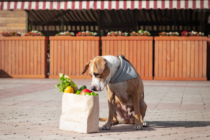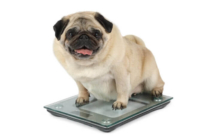
DogFoodAdvisor is reader supported See how
Dog Food Advisor is 100% impartial and is never paid to promote any brand. But if you buy using links on this page, we may earn a referral fee.
Just lie back and soak up that vitamin D…
There’s nothing quite like the sun’s warmth on your skin (in healthy doses, of course), especially after a long, dark winter. You can almost feel the benefits sinking into your body. We all know how essential sunlight is for producing vitamin D, which plays a crucial role in calcium absorption and bone health. It helps plants, crops and humans thrive.
But what about dogs?
During winter, or if you live somewhere with little sunlight, you might take a vitamin D supplement to prevent deficiency. But have you asked yourself: Could my dog be vitamin D deficient? Do dogs need sun exposure for vitamin D? Do dogs even need vitamin D?
We spoke with DFA’s nutritionist, Laura Ward, to break down everything you need to know about vitamin D in dogs.
Do dogs need vitamin D?
“Yes, vitamin D has an important role in calcium and phosphorus metabolism, bone calcification, and immunity for dogs,” says Laura.
Basically, without vitamin D, your dog wouldn’t be able to fully develop or maintain healthy muscles and bones.

Do dogs need vitamin D from the sun?
Sizzling like a crisp on the beach isn’t healthy, nor is sitting in a dark room 24 hours a day. We require a healthy amount of sunlight for many reasons, the main one being vitamin D. Sunlight causes our skin to make vitamin D, which is converted to the active form by your liver and kidneys — hence some people call it the “sunshine vitamin”.
You might assume the same applies to dogs but dogs’ skin actually lacks the ability to use sunlight to synthesize the vitamin D precursor in their skin. So, a dog’s only source of vitamin D is their diet.
What is the best source of vitamin D for dogs?
If you’re feeding your dog a high-quality and balanced dog food, they will receive enough vitamin D from their diet.
“If feeding a homemade or raw/BARF type diet, the balance of the nutrients and ensuring their adequacy becomes the responsibility of the pet parent,” says Laura.
“The diet must be carefully formulated with balanced nutrients. For example, using liver or eggs to meet the minimum vitamin D requirements could easily lead to an oversupply of other nutrients. It’s important to think carefully when trying to meet the minimum requirement of one vitamin not to overdo another.”
Cooking a homemade diet for your dog has lots of benefits and can absolutely be done if you know what you’re doing and know how to formulate a balanced diet. It’s best to seek the advice of a qualified veterinary nutritionist.

Do dogs need vitamin D supplements?
“If your dog is eating a complete and balanced dog food, do not supplement more vitamin D unless under veterinary direction,” says Laura. “As a fat-soluble vitamin, vitamin D is stored so excess could lead to toxicity.”
In a homemade diet, vitamin D should be reached with ingredients rather than supplements being required.
Do not give your dog human vitamin D supplements. If your dog eats one of your vitamin D tablets, contact the vet immediately for further instructions.
How do I add vitamin D to my dog’s food?
AAFCO recommends 500 IU/kg DM of vitamin D for dogs at all life stages. The richest natural sources are marine fish and fish oils, though they carry a risk of overdose. Other sources include freshwater fish, eggs, beef, liver, and dairy.
The most common synthetic sources are vitamin D3 and D2, but vitamin D3 is far more bioavailable (able to be absorbed and used by the body). In fact, vitamin D2 is no longer approved in Europe for this reason.
Again, you should not need to add further vitamin D to your dog’s diet unless told by your vet.
What are the symptoms of vitamin D deficiency in dogs?
Although rare, there have been cases of vitamin D deficiency in dogs. Signs of vitamin D deficiency include:
- Hair loss
- Fatigue
- Bone and muscle weakness
Insufficient vitamin D levels can lead to congestive heart failure in dogs, as well as an increased risk for complications due to heart disease and bone disorders such as osteomalacia (softening of bones) and rickets (bone deformities). 1.

Benefits of vitamin D for dogs
- Bone & Skeletal Health
Supports strong bones by regulating calcium and phosphorus levels.
- Immune Support
Helps the immune system fight infections and diseases.
- Muscle Health
Essential for muscle growth and proper function.
- Cognitive Function
May help prevent cognitive decline in older dogs.
- Cell Growth
Regulates cell development for healthy tissues and organs.
- Cardiovascular Health
Supports overall heart health.
Vitamin D toxicity in dogs
Too much vitamin D can also pose health issues for dogs.
“As mentioned, vitamin D is stored in fat tissue and the liver, says Laura. “So, the excess is not rapidly excreted in your dog’s urine.”
“Therefore excessive vitamin D can lead to hypercalcemia, due to vitamin D’s role in calcium metabolism. This can cause bone resorption, calcification of soft tissues, and in severe cases acute renal failure.”
What causes vitamin D toxicity in dogs?
Dogs that eat a diet containing too much vitamin D or if your dog eats a human supplement can develop toxicity. Another common way that dogs get vitamin D toxicity is after accidentally eating certain chemicals meant to kill rodents like rats and mice, called cholecalciferol rodenticides. Cholecalciferol is the chemical name for vitamin D3.
Symptoms of vitamin D toxicity in dogs
Dogs with excess vitamin D may show the following signs:
- Vomiting
- Loss of appetite
- Drinking more
- Urinating more
- Drooling excessively
- Loss of weight
Depending on the concentration of vitamin D in the food, diet-related toxicity tends to develop more gradually over time. Cases of vitamin D rodenticide or supplement poisoning are rapid onset — showing signs of illness in a matter of hours or days.
If you suspect your dog is showing signs of vitamin D toxicity, take them to a vet immediately.
Final word
The Dog Food Advisor does not accept money, gifts, samples or other incentives in exchange for special consideration in preparing our reviews.
However, we do receive a referral fee from online retailers (like Chewy or Amazon) and from sellers of perishable pet food when readers click over to their websites from ours. This helps cover the cost of operation of our free blog. Thanks for your support.
For more information, please visit our Disclaimer and Disclosure page.
Article reviewed by
Laura Ward
Pet Nutritionist
Laura studied BSc (Hons) Animal Science with an accreditation in Nutrition at the University of Nottingham, before working for eight years in the pet food and nutrition industry.




